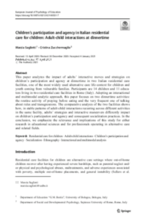Abstract
This paper analyzes the impact of adults’ interactive moves and strategies on children’s participation and agency at dinnertime in two Italian residential care facilities, one of the most widely used alternative care life-context for children and youth coming from vulnerable families. Participants are 14 children and 11 educators living in two residential care facilities in Rome (Italy). Adopting an interactional and multimodal analytic approach, this paper focuses on two dinnertime activities: the routine activity of praying before eating and the very frequent one of talking about rules and transgressions. The comparative analysis of the two facilities shows how, in stable patterns of adult-child interactions recurring across different activities in the same facility, adults’ strategies and interactive maneuvers differently impact on children’s participation and agency and consequent socialization practices. In the conclusion, we emphasize the relevance and implications of this study for either research in educational sciences and for professionals operating in alternative care and related fields.

